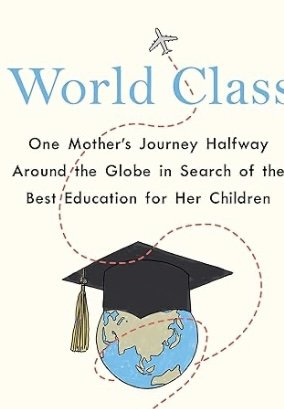World Class by Teru Clavel (Simon & Schuster)
When Teru Clavel’s husband is transferred from New York to Hong Kong in 2006, she’s relieved. The oldest of her two young sons is approaching the age where preschool is in his future and in Manhattan, this is no trivial landmark. The right preschool will determine his future education, right up to his choice of university, and the application process is almost a blood sport. Parents begin this rigorous journey even before the future student emerges on a delivery table, moving to the right neighborhood, joining the right church, and finding the right consultants in tandem with “preschool prep” classes.
The Clavel family falls into the category of “moderately to extremely wealthy” and both parents were educated at all the right schools but Teru had an additional advantage. Her Japanese mother sent her to public school in Japan every summer. With that background, she’s eager to give that same sort of opportunity to her children--and for the next ten years, she does.
At first her two-year-old son James is enrolled in a prestigious, private preschool but his mother begins to chafe against the affluent bubble that Hong Kong provides to wealthy expatriates. With her Japanese public school experience, she finds the same thing for James by the time he’s three and is delighted that by the time he’s four, he’s given homework and is a confident speaker of Chinese--or Mandarin as Teru terms it throughout her book.
When her husband is transferred to Shanghai, they all leave any form of expat lifestyle behind in Hong Kong and enter what Teru calls “family detox.” Their apartment is inhabited by rats, roaches, and termites and James, at six, becomes his mother’ s interpreter when they go to stores and markets. But Teru’s determination gets her sons into public schools, where James is the sole foreigner in his class and Charles is only one of several in his preschool. There the family discovers that Shanghai invests in teachers’ salaries and continuing professional development, with generous resources given to English language instruction and education for students with special needs. Unlike their U.S. counterparts, schools don’t spend money on technology, attractive classrooms, or elaborate playgrounds.
In her sons’ schools, Teru finds, teachers concentrate on mastery of a subject for every student and they will stay after school with anyone who needs help to reach that point. “There is no ‘bad at math,’ Teru says, “any grade below 95 is considered a failure.” First grade students begin to learn the rudiments of algebra. While classes concentrate on rote memorization, speed drills, and repeating what a teacher has just said, this pays off. In an international test administered by the Organization for Economic Cooperation and Development, the PISA (Program for International Student Assessment) that focuses on math, science, and reading, Shanghai was at the top in all three in 2009 and “ranked three full grade levels above the average score overall” in 2010.
At the same time, James and Charles found a sense of community in their schools, to the point that when Charles was briefly hospitalized, his teacher, several of his classmates, and their parents visited him.
By the time the Clavels are transferred to Tokyo, a new addition to their family, Victoria, is almost ready for preschool. While James and Charles have learned discipline and self-control in their Shanghai school, Victoria at the age of three barely squeaks into a Tokyo preschool. “Make sure Victoria understands social norms here before she starts school,” the principal warns Teru. Her older brothers are given a crash course in Japanese before beginning their four years of public school.
Perhaps because Teru received a generous helping of Japanese education as a child, she spends less time describing the experience that her children underwent. She stresses the importance Japan places on educating “the whole child,” fostering independence and giving a thorough grounding in nutrition as well as providing curriculum that is stable and carefully planned system-wide. In Japan, she says, textbooks are written and approved by teachers. A parent-teacher journal comes home with each child every night and families are encouraged to come into their student’s classroom for observation days. “It was an efficient, transparent system that had stood the test of time.”
Returning to U.S. schools in 2016 is a shock to everyone. Although the Clavel children attend public school in the wealthy area of Palo Alto, the best ranked school district in California, they find sports are stressed above academic subjects. In James’s English class, seventh-graders are required to read no more than three books all year and their teacher will critique only three essays “because there’s not enough time.” Charles is delighted that he watched “ten movies in full” during his year of fifth grade. Both boys are two years ahead of their grade level in math.
The solution? Go full circle. Move to Manhattan and put the children in private school.
Although World Class is a more cursory examination of education overseas than Little Soldiers (Asia by the Book, December 2022), Teru Clavel gives a surprising and often shocking comparison of U.S. education during a time when we need to hear this more than ever.~Janet Brown
